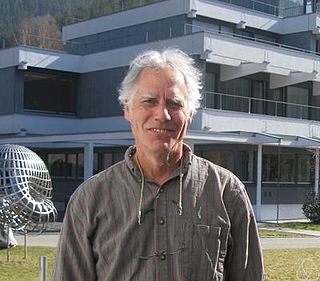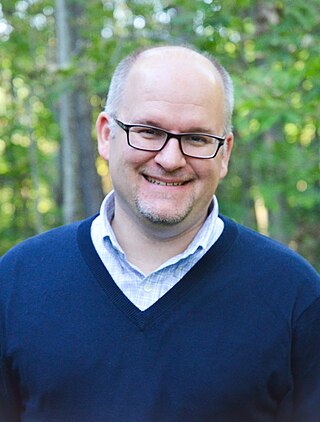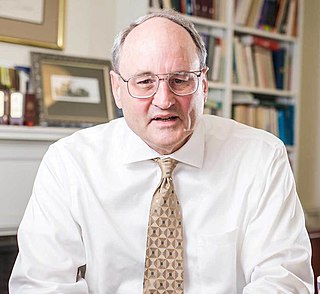Related Research Articles

Judea Pearl is an Israeli-American computer scientist and philosopher, best known for championing the probabilistic approach to artificial intelligence and the development of Bayesian networks. He is also credited for developing a theory of causal and counterfactual inference based on structural models. In 2011, the Association for Computing Machinery (ACM) awarded Pearl with the Turing Award, the highest distinction in computer science, "for fundamental contributions to artificial intelligence through the development of a calculus for probabilistic and causal reasoning". He is the author of several books, including the technical Causality: Models, Reasoning and Inference, and The Book of Why, a book on causality aimed at the general public.

Mathematical statistics is the application of probability theory, a branch of mathematics, to statistics, as opposed to techniques for collecting statistical data. Specific mathematical techniques which are used for this include mathematical analysis, linear algebra, stochastic analysis, differential equations, and measure theory.
The Rubin causal model (RCM), also known as the Neyman–Rubin causal model, is an approach to the statistical analysis of cause and effect based on the framework of potential outcomes, named after Donald Rubin. The name "Rubin causal model" was first coined by Paul W. Holland. The potential outcomes framework was first proposed by Jerzy Neyman in his 1923 Master's thesis, though he discussed it only in the context of completely randomized experiments. Rubin extended it into a general framework for thinking about causation in both observational and experimental studies.
Stephen Webb Raudenbush is the Lewis-Sebring Professor of Sociology and Chairman of the Committee on Education at the University of Chicago. He is best known for his development and application of hierarchical linear models (HLM) in the field of education but he has also published on other subjects such as health and crime. Hierarchical linear models, which go by many other names, are used to study many natural processes. To use an example from education, a three level hierarchical model might account for the fact that students are nested in classrooms which are nested in schools. With the right data one could go further and note that schools are nested in districts which are nested in states. Repeated measures of the same individuals can be studied with these models as observations nested in people.
The average treatment effect (ATE) is a measure used to compare treatments in randomized experiments, evaluation of policy interventions, and medical trials. The ATE measures the difference in mean (average) outcomes between units assigned to the treatment and units assigned to the control. In a randomized trial, the average treatment effect can be estimated from a sample using a comparison in mean outcomes for treated and untreated units. However, the ATE is generally understood as a causal parameter that a researcher desires to know, defined without reference to the study design or estimation procedure. Both observational studies and experimental study designs with random assignment may enable one to estimate an ATE in a variety of ways.

James M. Robins is an epidemiologist and biostatistician best known for advancing methods for drawing causal inferences from complex observational studies and randomized trials, particularly those in which the treatment varies with time. He is the 2013 recipient of the Nathan Mantel Award for lifetime achievement in statistics and epidemiology, and a recipient of the 2022 Rousseeuw Prize in Statistics, jointly with Miguel Hernán, Eric Tchetgen-Tchetgen, Andrea Rotnitzky and Thomas Richardson.

David Amiel Freedman was a Professor of Statistics at the University of California, Berkeley. He was a distinguished mathematical statistician whose wide-ranging research included the analysis of martingale inequalities, Markov processes, de Finetti's theorem, consistency of Bayes estimators, sampling, the bootstrap, and procedures for testing and evaluating models. He published extensively on methods for causal inference and the behavior of standard statistical models under non-standard conditions – for example, how regression models behave when fitted to data from randomized experiments. Freedman also wrote widely on the application—and misapplication—of statistics in the social sciences, including epidemiology, public policy, and law.
David Collier is an American political scientist specializing in comparative politics. He is Chancellor's Professor Emeritus at the University of California, Berkeley. He works in the fields of comparative politics, Latin American politics, and methodology. His father was the anthropologist Donald Collier.
Matching is a statistical technique that evaluates the effect of a treatment by comparing the treated and the non-treated units in an observational study or quasi-experiment. The goal of matching is to reduce bias for the estimated treatment effect in an observational-data study, by finding, for every treated unit, one non-treated unit(s) with similar observable characteristics against which the covariates are balanced out. By matching treated units to similar non-treated units, matching enables a comparison of outcomes among treated and non-treated units to estimate the effect of the treatment reducing bias due to confounding. Propensity score matching, an early matching technique, was developed as part of the Rubin causal model, but has been shown to increase model dependence, bias, inefficiency, and power and is no longer recommended compared to other matching methods. A simple, easy-to-understand, and statistically powerful method of matching known as Coarsened Exact Matching or CEM.
Clark N. Glymour is the Alumni University Professor Emeritus in the Department of Philosophy at Carnegie Mellon University. He is also a senior research scientist at the Florida Institute for Human and Machine Cognition.
Joshua Brett Tenenbaum is Professor of Computational Cognitive Science at the Massachusetts Institute of Technology. He is known for contributions to mathematical psychology and Bayesian cognitive science. According to the MacArthur Foundation, which named him a MacArthur Fellow in 2019, "Tenenbaum is one of the first to develop and apply probabilistic and statistical modeling to the study of human learning, reasoning, and perception, and to show how these models can explain a fundamental challenge of cognition: how our minds understand so much from so little, so quickly."
Causal inference is the process of determining the independent, actual effect of a particular phenomenon that is a component of a larger system. The main difference between causal inference and inference of association is that causal inference analyzes the response of an effect variable when a cause of the effect variable is changed. The study of why things occur is called etiology, and can be described using the language of scientific causal notation. Causal inference is said to provide the evidence of causality theorized by causal reasoning.

Guido Wilhelmus Imbens is a Dutch-American economist whose research concerns econometrics and statistics. He holds the Applied Econometrics Professorship in Economics at the Stanford Graduate School of Business at Stanford University, where he has taught since 2012.
Mark Johannes van der Laan, Ph.D is a Dutch-American biostatistician. He is currently a Professor of Biostatistics and Statistics at the University of California, Berkeley, where he holds the position of the Jiann-Ping Hsu/Karl E. Peace Endowed Chair in Biostatistics. He has made contributions to survival analysis, semiparametric statistics, multiple testing, and causal inference. He also developed the targeted maximum likelihood estimation methodology. He is a founding editor of the Journal of Causal Inference. Developed in response to challenges dealing with the curse of dimensionality and the complexity of real-world data, Targeted Learning is subfield of statistics applicable across a variety of applications, including the analysis of clinical trials, assessment of (causal) effects in observational and real-world evidence studies, and the analysis of high-dimensional and multi-modal data.

Stephen Lawrence Morgan is a Bloomberg Distinguished Professor of Sociology and Education at the Johns Hopkins University School of Arts and Sciences and Johns Hopkins School of Education. A quantitative methodologist, he is known for his contributions to quantitative methods in sociology as applied to research on schools, particularly in models for educational attainment, improving the study of causal relationships, and his empirical research focusing on social inequality and education in the United States.
Alan Enoch Gelfand is an American statistician, and is currently the James B. Duke Professor of Statistics and Decision Sciences at Duke University. Gelfand’s research includes substantial contributions to the fields of Bayesian statistics, spatial statistics and hierarchical modeling.

Henry E. Brady is an American political scientist specializing in methodology and its application in a diverse array of political fields. He was Dean of the Goldman School of Public Policy at University of California, Berkeley from 2009–2021 and holds the Class of 1941 Monroe Deutsch Professor of Political Science and Public Policy. He was elected President of the American Political Science Association, 2009–2010, giving a presidential address entitled "The Art of Political Science: Spatial Diagrams as Iconic and Revelatory." He has published academic works on diverse topics, co-authoring with colleagues at a variety of institutions and ranks, as well as many solo authored works. His principal areas of research are on political behavior in the United States, Canada, and the former Soviet Union, public policy and methodological work on scaling and dimensional analysis. When he became President of the American Political Science Association, a number of his colleagues and co-authors contributed to his presidential biography entitled "Henry Brady, Big Scientist," discussing his work and the fields to which he has contributed and has also shaped.
Causal analysis is the field of experimental design and statistical analysis pertaining to establishing cause and effect. Exploratory causal analysis (ECA), also known as data causality or causal discovery is the use of statistical algorithms to infer associations in observed data sets that are potentially causal under strict assumptions. ECA is a type of causal inference distinct from causal modeling and treatment effects in randomized controlled trials. It is exploratory research usually preceding more formal causal research in the same way exploratory data analysis often precedes statistical hypothesis testing in data analysis
Jennie E. Brand is an American sociologist and social statistician. She studies stratification, social inequality, education, social demography, disruptive events, and quantitative methods, including causal inference. Brand is currently Professor of Sociology and Statistics at the University of California, Los Angeles (UCLA), where she directs the California Center for Population Research and co-directs the Center for Social Statistics.

Roderick Joseph Alexander Little is an academic statistician, whose main research contributions lie in the statistical analysis of data with missing values and the analysis of complex sample survey data. Little is Richard D. Remington Distinguished University Professor of Biostatistics in the Department of Biostatistics at the University of Michigan, where he also holds academic appointments in the Department of Statistics and the Institute for Social Research.
References
- ↑ "Jasjeet Sekhon". Department of Statistics and Data Science. Yale University. Retrieved 4 June 2021.
- 1 2 "Jas Sekhon Selected as a Fellow of the American Statistical Association". Department of Statistics and Data Science. Yale University. Retrieved 4 June 2021.
- 1 2 3 "Fellows". Cambridge University Press. Society for Political Methodology. Retrieved 4 June 2021.
- ↑ "Jasjeet Sekhon". Jasjeet Sekhon. Retrieved 3 June 2021.
- 1 2 "Jasjeet Sekhon". New Ladder Faculty (2020-2021). Yale University. Retrieved 4 June 2021.
- ↑ "Curriculum Vitae" (PDF).
- ↑ "How 9 hedge funds including Bridgewater, Millennium and AQR are thinking about AI -- and the 11 experts leading the charge" (PDF). Business Insider.
- ↑ "One of Bridgewater's top investors explains why the world's largest hedge fund is handing the investment process over to AI in a new fund". Business Insider.
- ↑ "Sekhon named Meyer Professor of Political Science and Statistics and Data". YaleNews.
- 1 2 ""Jasjeet S. Sekhon - Google Scholar"". Jasjeet S. Sekhon - Google Scholar. Google Scholar. Retrieved 28 November 2021.
- ↑ Sekhon, Jasjeet; Chung, Raymond; Epstein, Mark; Kaplan, Marshal (2005). "Steroid-Responsive (Autoimmune?) Sclerosing Cholangitis". Digestive Diseases and Sciences. 50 (10): 1838–1843. doi:10.1007/s10620-005-2948-3. PMID 16187184. S2CID 15494269.